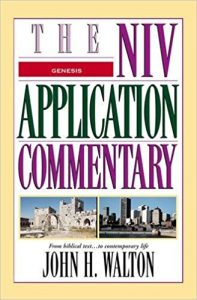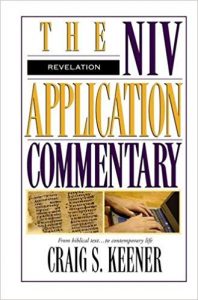The NIV Application Commentary series has been a go-to biblical resource for pastors for since Zondervan began publishing it two decades ago.
NIVAC volumes are known for being accessible and affordable, but most of all, these commentaries have a reputation for helping the reader apply the biblical text to twenty-first century life.

Pastors from various denomination, and professors from diverse theological seminaries, have praised this series for being biblical, relevant, and budget-friendly.
Which commentary series is best for your purposes? See Best Bible Commentaries: Top 50. Based on aggregate reviews.
Since the 1990’s, the NIVAC series has been producing commentaries that discuss the first century, in relation to understanding the biblical text, and the twenty-first century, in relation to applying it.
It is not the intention of the publisher or the editors to produce technical volumes that dive deeply into the original languages, non-biblical literature, or latest scholarship.
Authors may reference these topics, but they are not the focus of the commentaries.
The NIVAC series is incomplete; however, the final volumes in the series are expected to be released in 2020.
 | Please subscribe to my YouTube channel to see weekly videos on Bible commentaries. |
Original Meaning, Bridging Contexts, Contemporary Significance
The purpose of the NIVAC series can be clearly seen in the three ways each biblical passages is discussed:
- First, the author writes about the “Original Meaning” of the passage, which is where exegesis occurs.
- Next, comes “Bridging Contexts,” in which parallels are drawn between first-century and twenty-first century living.
- “Contemporary Significance” is third, which is where the author suggests applications, which may include illustrations, quotations, statistics, and other aids that can assist preachers.
Robert Yarbrough’s review in the Journal of the Evangelical Theological Society of Gary M. Burge’s Letters of John volume in the NIVAC series can be used as a representative example of how authors use the three series-prescribed categories.
Yarbrough notes that of the pages in Burge’s commentary “48% are devoted to exegesis, 14% to erecting bridges and 38% to application.” He adds, “This truly is an ‘application’ commentary compared to most, as its title promises.” [1]
Please see how the NIVAC series compares to dozens of other commentary series on the Bible Commentaries Comparison Chart.

NIV Application Commentary (NIVAC): Reviews, Theology
Among the best-reviewed Old Testament volumes include John Walton’s Genesis commentary, Roy Gane’s Leviticus and Numbers commentary, Karen Jobes’ Esther commentary, and John Oswalt’s Isaiah commentary. A
mong the best-reviewed New Testament volumes include Darrell Bock’s Luke commentary, Gary Burge’s John commentary, Douglas Moo’s Romans commentary, George Guthrie’s Hebrews commentary, and Craig Keener’s Revelation commentary.
Theologically, the NIVAC series is broadly evangelical. The authors, who come from various denominational traditions, generally arrive at conservative theological conclusions.
However, one particular volume came under criticism after its author was suspended by the seminary where he taught.
Peter Enns, who wrote the Exodus commentary in the series, was suspended by Westminster Seminary in 2005, after the publication of a book, Inspiration and Incarnation: Evangelicals and the Problem of the Old Testament, which some argue challenges the doctrine of inerrancy. [2]
The book was well-reviewed by notable commentators such as Tremper Longman III and Joel B. Green. It was criticized by notable commentators such as D.A. Carson and G.K. Beale.
The controversy did not directly concern the Exodus volume in the NIVAC series, which is one of the best reviewed commentaries in print today.
Nevertheless, some reviewers have suggested not purchasing the volume because of the positions Enn’s takes in his other writings. [3]
Interviews from the NIVAC Series on Best Bible Commentaries
I am pleased to have interviewed authors from the NIVAC series on Best Bible Commentaries. Please follow the links provided below to read the Q & A’s in their entirety.
Roy Gane Q & A on Leviticus and Numbers
Preview: “The whole writing project personally edified me and drew me closer to Christ, first as I saw the loving character of God reflected in the sacrifices foreshadowing the sacrifice of Christ and in the way he reached out to his people and interacted with them as close as he could get from his sanctuary residence among them.”
Andrew E. Hill Q & A on 1-2 Chronicles
Preview: “I enjoyed writing about King David as a worshiper, and a worship leader. In part, because of the interest one of our sons has in the character of King David.
I was also prompted to develop the topics by the work of former students who wrote thoughtful papers on the subject of King David and worship (appropriately credited in the commentary).”
George Guthrie Q & A on Hebrews
Preview: “As I came to the climax of the christology in Hebrews, particularly 9:11-10:18, the decisiveness of Christ’s sacrifice for our sins really impressed me and has continued to be a cornerstone of my own faith.”
Also see: Gary Burge on the Gospel of John
NIV Application Commentary Volumes
The links below go to Amazon using each book’s exact ISBN.
New Testament
1 Corinthians – Craig L. Blomberg
2 Corinthians – Scott J. Hafemann
Philippians – Frank S. Thielman
Colossians-Philemon – David E. Garland
1-2 Thessalonians – Michael W. Holmes
1-2 Timothy, Titus – Walter L. Liefeld
2 Peter, Jude – Douglas J. Moo
The Letters of John – Gary M. Burge
Old Testament
The links below go to Amazon using each book’s exact ISBN.
Joshua – Robert L. Hubbard, Jr.
Judges, Ruth – K. Lawson Younger
1 and 2 Samuel – Bill T. Arnold
1 and 2 Kings – August H. Konkel
1 and 2 Chronicles – Andrew E. Hill
— Ezra (no volume yet) —
— Nehemiah (no volume yet) —
Psalms, Vol. I – Gerald H. Wilson
Psalms, Vol. II – W. Dennis Tucker, Jr. and Jamie A. Grant
Ecclesiastes and Song of Solomon – Iain Provan
Jeremiah, Lamentations – J. Andrew Dearman
Hosea, Amos, and Micah – Gary V. Smith
Joel, Obadiah, Malachi – David W. Baker
Jonah-Nahum-Habakkuk-Zephaniah – James Bruckner
Haggai-Zechariah – Mark J. Boda
References
Yarbrough, Robert W. Source: Journal of the Evangelical Theological Society, 42 no 2 Jun 1999, p 370-372 (subscription required)
https://www.christianitytoday.com/news/2008/april/114-24.0.html
https://credomag.com/2015/12/what-about-peter-enns-exodus-commentary-timothy-raymond/

